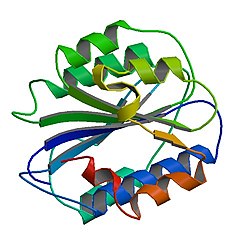Von Willebrand factor
Von Willebrand factor (vWf) is a glycoprotein involved in the second part of the hemostatic process − platelet reaction.
vWF:
Synthesis[edit | edit source]
- by endothelial cells (subsequently stored in Weibel-Palade bodies);
- megakaryocytes;
- platelets (in α-granules);
- subendothelium.
Structure[edit | edit source]
The basic monomer of vWF is a protein made up of 2050 AMK. We distinguish several domains on it that have a specific function:
- A1 domain binds to:
- platelet membrane,
- heparin.
- A3 domain binds to collagen,
- the "cysteine knot" domain – facilitates the formation of dimers,
- D'/D3 domain binds to inactive plasma factor VIII.
Monomers of vWF are further organized into dimers (in the endoplasmic reticulum) and then into multimers (in the Golgi apparatus). Multimers consist of 80 or more subunits linked by disulfide bonds and are among the largest molecules in blood plasma.
Von Willebrand factor is one of the few proteins that carries blood group AB0 agglutinogens. Blood group also depends on the level of vWF in the plasma. People with group 0 have the lowest levels, while people with group AB have the highest.
Features[edit | edit source]
Von Willebrand factor is involved in primary hemostasis by mediating platelet aggregation and adhesion to collagen. Only large multimeters are capable of performing this function. Furthermore, vWF also has its function in secondary hemostasis, where it stabilizes FVIII (binds it to itself). By binding to FVIII, vWF prevents its inactivation by proteases such as protein C or FXa.
Deficiency or defect in vWF manifests as von Willebrand disease - bleeding conditions.
Breakdown[edit | edit source]
Von Willebrand factor is cleaved by metalloproteases (between tyrosine and methionine) into smaller sections, which are limited in their ability to induce aggregation and adhesion as much.
Links[edit | edit source]
Related Articles[edit | edit source]
External links[edit | edit source]
- Von Willebrand factor
- RAUCH, Antoine – WOHNER, Nikolett – CHRISTOPHE, Olivier D. On the Versatility of von Willebrand Factor. Meditter J Hematol Infect Dis [online]. 2013, vol. 5, no. 1, p. -, Available from <https://www.mjhid.org/index.php/mjhid/index>. ISSN 2035-3006. DOI: 10.4084/MJHID.2013.046.
References[edit | edit source]
- KITTNAR, Otomar. Lékařská fyziologie. 1.. edition. Grada Publishing, a.s, 2011. 800 pp. ISBN 978-80-247-3068-4.
- Von Willebrand factor - function. [online]. [feeling. 2014-01-22]. Available from: http://ciselniky.dasta.mzcr.cz/hypertext/200630/hypertext/_KOMP_VWFFCE.htm



